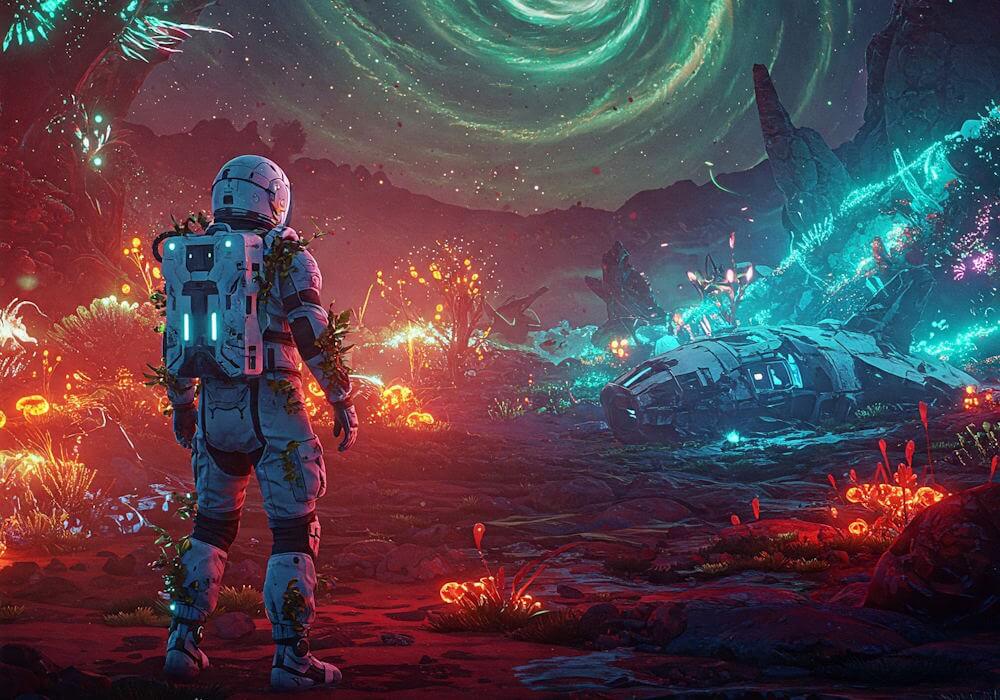Returnal, developed by Housemarque, stands out as a critically acclaimed entry within the roguelike genre of video games. Released for the PlayStation 5, this title intricately weaves elements of science fiction into its gameplay, resulting in a unique experience that successfully combines thrilling mechanics with an emotionally resonant story. Set on the alien planet of Atropos, players assume the role of Selene, an astronaut trapped in a time loop as she explores the eerie landscapes and confronts a myriad of foes that vary with each run.
The gameplay mechanics of Returnal are significantly influenced by its roguelike structure. Players face a relentless cycle of death and rebirth, where every defeat leads to a complete reset, creating a heightened sense of suspense and urgency. This feature encourages strategic thinking and adaptability, as each session provides new challenges and opportunities for improvement. The procedurally generated environments ensure that no two runs are ever identical, fostering a dynamic exploration of the hauntingly beautiful and perilous world of Atropos.
What truly differentiates Returnal from other games within the roguelike category is not merely its gameplay but also its deep emotional narrative. As Selene navigates through the planet’s treacherous terrain, she unravels both the alien mysteries of Atropos and her own past, engaging players in a poignant journey of self-discovery and resilience. These emotional elements invite players to reflect on themes such as isolation, loss, and the human condition, enriching the overall gaming experience beyond mere entertainment. Thus, Returnal manages to blend cutting-edge gameplay with a soulful story, affirming its place as a standout title in the realm of modern gaming.
The Roguelike Mechanics at Play
Returnal stands out in the contemporary gaming landscape as a compelling representation of the roguelike genre. One of the defining characteristics of this title is its procedural generation of levels, a feature that contributes significantly to its longevity and replayability. Each time a player returns to the game after dying, they encounter a unique combination of environments, enemy placements, and item locations. This dynamic design ensures that no two playthroughs are the same, fostering a sense of discovery and unpredictability. For instance, players may find themselves navigating through a dense forest one time, only to confront stark, alien ruins in the next, amplifying the tension and excitement during each session.
Moreover, the permadeath mechanics integral to Returnal further accentuate the roguelike experience. Upon dying, players lose all acquired items and progress, forcing them to restart from the beginning of their current biome. This element of challenge not only raises the stakes but also encourages a meticulous approach to gameplay. Each encounter with adversaries becomes a strategic battle, as players must learn from their previous mistakes and adapt their tactics. Take, for example, the encounter with the towering foes known as the “Bosses,” which can only be overcome through perseverance and careful planning. Each death prompts players to reflect on their strategies, learn enemy patterns, and improve their overall performance.
The looping gameplay structure also plays a critical role in Returnal’s design, creating an emotional resonance as players become immersed in the protagonist Selene’s journey. The combination of procedural generation, permadeath, and relentless progression serves to challenge players, while simultaneously deepening their attachment to the narrative. As players traverse the ever-shifting landscapes of Atropos, they are continually faced with unforeseen obstacles and narratives, making each journey uniquely compelling and further establishing Returnal as a modern classic within the roguelike genre.
Set in a Sci-Fi World: The Enigmatic Universe of Returnal
Returnal transports players to the mysterious alien planet of Atropos, a landscape that is both breathtaking and haunting. The game portrays an environment marked by ever-shifting terrains, from ominous forests to desolate ruins and the breathtaking remnants of ancient civilizations. Atropos is not merely a backdrop; it is a character in its own right—an ever-evolving world that becomes an integral part of the narrative experience, rich with lore and secrets waiting to be uncovered.
The lore surrounding Atropos paints a picture of a world once vibrant with life, now shrouded in decay and alien menace. Players encounter strange entities, each with its story and significance, helping to weave a deeper narrative. The immersive storytelling is further enhanced by environmental storytelling, where each corner of Atropos holds visual cues that hint at its past, encouraging players to piece together the fragmented history while navigating through perilous encounters.
Conceptually, Returnal draws upon familiar sci-fi motifs, yet it distinguishes itself with unique art and design choices. The use of vibrant yet unsettling color palettes creates an atmosphere that is both alien and familiar. The design of creatures and structures reflects a blend of organic and mechanical elements, akin to other celebrated sci-fi franchises, such as “Mass Effect” or “The Outer Worlds.” This clever interplay not only captivates players but also sets a mood that aligns with the existential themes of fear and discovery found within the game.
Overall, Returnal encapsulates what makes science fiction compelling—its ability to explore the unknown, to confront fears, and to evoke emotional responses. As players traverse the surreal landscapes of Atropos, they are not just engaging with a game, but unfolding an intricate narrative that resonates on multiple levels, making their journey both thrilling and profoundly existential.
Narrative Complexity: Emotions within a Cyclical Journey
The narrative of Returnal presents a rich tapestry of emotional themes woven intricately into the gameplay. At the heart of this experience is Selene, the protagonist, whose journey is not solely a physical one but an intimate exploration of her psyche. As players navigate through the alien planet Atropos, they encounter not just formidable adversaries but also the profound weight of isolation and loss. This cyclical gameplay experience mirrors Selene’s emotional turmoil, reflecting her struggles with trauma and grief.
Throughout the game, Selene is trapped in an endless loop, each death offering a reset that invites players to explore her psyche further. This narrative design is not merely a mechanic; it serves as a powerful metaphor for her internal battles. The repetition echoes the often inescapable nature of trauma, provoking a contemplation of how these cycles govern Selene’s existence. As players die and respawn, they witness not only the landscape’s transformations but also Selene’s emotional state—her frustration, fear, and yearning for understanding. This duality enhances player engagement, prompting a deeper investment in Selene’s story.
The game delicately unfurls its themes of isolation and loss, drawing players into Selene’s isolation. Her longing for connection and understanding is palpable, making her journey relatable despite the otherworldly setting. Cutscenes, environmental storytelling, and audio logs piece together Selene’s past, revealing layers of her character—a mother, a lost figure, and ultimately, a survivor. The resulting experience is one that goes beyond mere entertainment; it invites introspection about the struggles of personal loss and the journey toward healing, making Returnal a poignant exploration of emotional complexity within a roguelike framework.
Gameplay Mechanics: Combat, Exploration, and Progression
Returnal offers a unique blend of gameplay mechanics that enhances the interactive experience by intertwining combat, exploration, and progression in a meticulously crafted manner. At the heart of the game is its combat system, which is characterized by fast-paced, bullet-hell action. Players must maneuver their character, Selene, through a barrage of enemy projectiles while delivering swift, precise attacks. This interplay creates a dynamic combat environment that demands quick reflexes and strategic thinking. The variety of weapons available provides players with multiple playstyles, allowing them to experiment and adapt their approach based on individual preferences or situational demands. Each weapon possesses distinct attributes and abilities, encouraging players to effectively choose and customize their arsenal to maximize effectiveness in combat encounters.
Exploration within Returnal is equally vital to the gameplay experience. The game’s procedurally generated environments ensure that players encounter new layouts and challenges with each cycle, which fosters a sense of unpredictability and excitement. This unpredictable level design compels players to maintain a keen sense of awareness, as enemies evolve and obstacles shift, further heightening the tension and engagement during gameplay. Players are also encouraged to explore the intricacies of the environment to uncover hidden secrets, artifacts, and upgrades that can significantly influence their progression throughout the game.
To successfully navigate through the levels, players must adopt adaptable strategies that align with the game’s ever-changing nature. The significance of learning from each playthrough cannot be overstated; understanding enemy patterns, weapon synergies, and environmental interactions are crucial for progression. As players face a perpetual cycle of life and death, they will gain invaluable insights that enhance their skills, making each run a foundational element in their growth within this captivating universe. Overall, the harmonious blend of combat, exploration, and progression mechanics establishes Returnal as a compelling roguelike experience that profoundly resonates with gamers.
The Role of Sound and Music in Creating Atmosphere
In Returnal, the audio design plays an integral role in establishing an immersive atmosphere that enhances the emotional experience of players. The game’s ambient soundtrack is carefully crafted to complement the visual narrative, drawing players deeper into the alien world of Atropos. With a mix of haunting melodies and unsettling soundscapes, the music evokes feelings of isolation, wonder, and fear, mirroring the protagonist’s internal struggles as she faces an unrelenting cycle of death and rebirth. The soundtrack’s dynamic nature ensures that it evolves and reacts to gameplay, heightening tension during intense encounters and providing a moment of calm during exploration.
Sound effects also serve as a vital component in Returnal’s audio landscape. Each sound cue is meticulously designed to correspond with in-game actions and environments. For instance, the rustling of foliage and distant echoes create a sense of unease as players explore the desolate terrain. Additionally, distinct audio feedback from weapon fire and enemy attacks not only enhances the gameplay mechanics but also heightens the emotional stakes, as every sound reinforces the life-and-death nature of the protagonist’s journey. These auditory elements are essential in establishing the game’s overall tone, making players more attuned to their surroundings and more responsive to unfolding events.
Furthermore, the voice acting in Returnal adds an important layer to the storytelling and emotional resonance of the game. Through Selene’s dialogue and her emotional outbursts, players gain insight into her psyche, fostering a connection that transcends the gameplay itself. This intimate audio storytelling is crucial in humanizing an otherwise solitary character, making the struggle for survival not just a physical challenge, but also an emotional one. The combination of ambient music, sound effects, and voice work exemplifies Returnal’s dedication to creating a rich, auditory experience that significantly impacts player engagement and emotional attachment to the narrative.
Community and Cultural Impact
Returnal has garnered significant attention since its release, revolutionizing the roguelike genre with its unique blend of sci-fi storytelling and challenging gameplay mechanics. The game has received widespread critical acclaim for its innovative design and emotional depth, reflected in its high ratings from prominent gaming publications. A notable aspect of its success is its achievement in various industry awards, including nominations and wins for categories such as Best Game, Best Game Direction, and Best Narrative at events like The Game Awards.
Engaging with the gaming community, Returnal has sparked extensive discussions and analyses among players and critics alike. Many players have shared their interpretations of the game’s intricate themes surrounding loss, resilience, and the human experience. These discussions have led to the establishment of a dedicated fan base that thrives on exploring the narrative layers hidden within the gameplay, demonstrating how Returnal resonates with audiences on multiple levels. The game’s unique approach to storytelling through environmental design and character dynamics prompts deeper reflections on existential themes, igniting passionate discourse in forums and social media platforms.
Moreover, Returnal’s impact extends beyond its immediate audience; it has served as an inspiration for other developers within the genre. By seamlessly merging roguelike elements with a rich narrative, it has encouraged other games to adopt a more profound storytelling approach, highlighting emotional connections rather than just gameplay mechanics. Consequently, Returnal has not only left its mark in terms of player engagement but has also influenced the direction of future titles in the roguelike and sci-fi landscapes, establishing a benchmark for what can be achieved in terms of narrative depth and emotional resonance within interactive entertainment.
Comparative Analysis: Returnal and Other Games in the Genre
Returnal, developed by Housemarque, stands out in the roguelike and sci-fi gaming genre, attracting players with its unique blend of fast-paced action and deep narrative. When comparing it to well-known titles like Hades and Dead Cells, several key elements emerge that highlight both its strengths and distinctive features.
Gameplay mechanics are a primary focus in any comparative analysis. Returnal introduces players to a continuous cycle of exploration, with procedurally generated environments that keep the gameplay fresh and challenging. Unlike the arcade-style combat of Hades or the Metroidvania mechanics of Dead Cells, Returnal emphasizes a third-person perspective that enhances immersion. The use of adaptive triggers and haptic feedback on the PlayStation 5 adds a tactile dimension, creating an emotional resonance during intense moments. While Hades offers players numerous choices in abilities and allies that affect the gameplay experience, Returnal’s focus remains on the solitary journey of Selene, intensifying the emotional stakes and player engagement.
Narrative plays a crucial role in differentiating Returnal from its contemporaries. Hades employs a rich cast of characters, often allowing for dialogue explorations that deepen connections over multiple runs. Conversely, Returnal follows a more introspective and personal narrative, exploring themes of loss, trauma, and existentialism through Selene’s journey in an alien world. This approach evokes a profound sense of solitude, resonating with players on an emotional level, which is somewhat neglected in the other titles mentioned.
In terms of emotional depth, Returnal perhaps leads the way. The game presents a hauntingly beautiful story that unfolds gradually, urging players to confront their fears and understand the protagonist’s struggles. This elevated narrative experience, coupled with innovative gameplay mechanics and a uniquely atmospheric setting, secures Returnal’s distinct place within the roguelike and sci-fi genre. Ultimately, these elements combine to create a memorable experience that challenges players both mechanically and emotionally, setting it apart from peers like Hades and Dead Cells.
Conclusion: The Legacy of Returnal
Returnal, a remarkable addition to the roguelike genre, has left an indelible mark on both players and the gaming industry. Through its innovative gameplay mechanics, emotional narrative, and atmospheric world-building, it has redefined the boundaries of what a roguelike can achieve. The game’s unique blend of fast-paced action and deep storytelling allows players to forge a personal connection with the protagonist, Selene, as she navigates through an alien landscape filled with peril and mystery. This narrative depth is seldom found in the genre and has differentiated Returnal from its peers.
The sophisticated integration of gameplay elements, such as procedural generation and permadeath, elevates the experience, challenging players to adapt and learn from each cycle. The intricate environment design and the hauntingly beautiful soundtrack further immerse players in the chilling and evocative atmosphere of Atropos. These components together not only enhance the gameplay experience but also contribute significantly to the storytelling, making each run feel uniquely personal and impactful.
Looking towards the future, there is a considerable anticipation surrounding potential sequels or expansions. The solid foundation laid by Returnal paves the way for new narratives and gameplay innovations within the franchise. The game’s success indicates a growing interest in combining emotional storytelling with dynamic gameplay, which may inspire other developers to explore these elements in their projects. As players reflect on their experiences with Returnal, it becomes evident that its influence will reverberate throughout the gaming community for years to come. We encourage readers to share their own thoughts on Returnal: what resonated with you, and how has this game shaped your perspective on the roguelike experience? Your insights can ignite an engaging conversation amongst fellow gamers.



